Analyzing Health Determinants Affecting Indigenous Australians
VerifiedAdded on 2023/01/12
|7
|2546
|72
Report
AI Summary
This report examines four key determinants of health impacting Aboriginal and Torres Strait Islander peoples in Australia: education, employment and income, racism and racial discrimination, and health behaviors and lifestyle. The analysis reveals that poor education, including low literacy and numeracy rates, significantly affects health outcomes and access to services. Limited employment opportunities and low income levels further exacerbate health disparities, leading to reduced access to healthcare and increased rates of illness. Racism and racial discrimination are identified as significant stressors, negatively impacting mental and physical health. Additionally, unhealthy lifestyles, including substance misuse, poor diet, and lack of physical activity, contribute to chronic diseases. The report highlights the interconnectedness of these factors and their cumulative impact on the health and well-being of Indigenous Australians, emphasizing the need for comprehensive interventions addressing these multifaceted challenges.

Paraphrase This Document
Need a fresh take? Get an instant paraphrase of this document with our AI Paraphraser
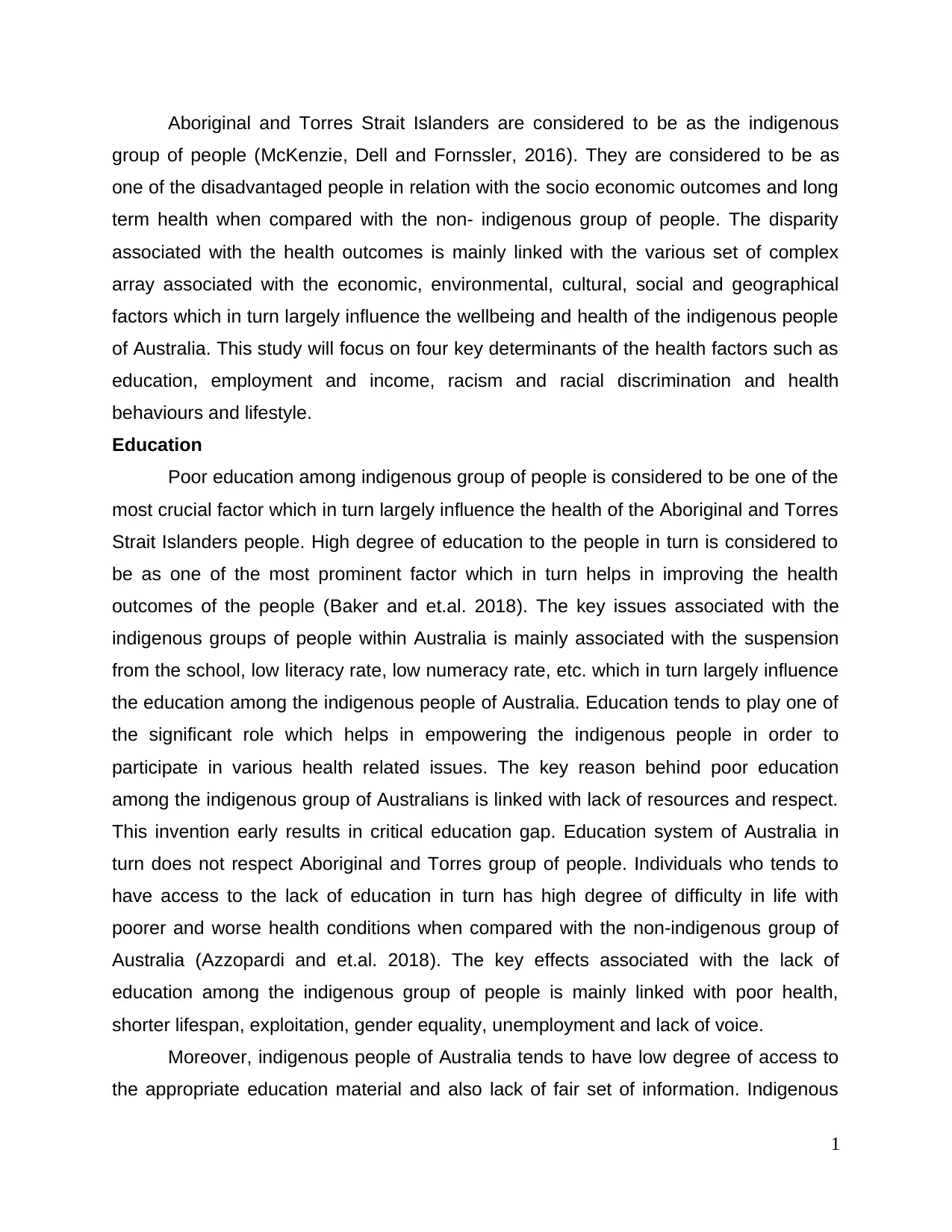
Aboriginal and Torres Strait Islanders are considered to be as the indigenous
group of people (McKenzie, Dell and Fornssler, 2016). They are considered to be as
one of the disadvantaged people in relation with the socio economic outcomes and long
term health when compared with the non- indigenous group of people. The disparity
associated with the health outcomes is mainly linked with the various set of complex
array associated with the economic, environmental, cultural, social and geographical
factors which in turn largely influence the wellbeing and health of the indigenous people
of Australia. This study will focus on four key determinants of the health factors such as
education, employment and income, racism and racial discrimination and health
behaviours and lifestyle.
Education
Poor education among indigenous group of people is considered to be one of the
most crucial factor which in turn largely influence the health of the Aboriginal and Torres
Strait Islanders people. High degree of education to the people in turn is considered to
be as one of the most prominent factor which in turn helps in improving the health
outcomes of the people (Baker and et.al. 2018). The key issues associated with the
indigenous groups of people within Australia is mainly associated with the suspension
from the school, low literacy rate, low numeracy rate, etc. which in turn largely influence
the education among the indigenous people of Australia. Education tends to play one of
the significant role which helps in empowering the indigenous people in order to
participate in various health related issues. The key reason behind poor education
among the indigenous group of Australians is linked with lack of resources and respect.
This invention early results in critical education gap. Education system of Australia in
turn does not respect Aboriginal and Torres group of people. Individuals who tends to
have access to the lack of education in turn has high degree of difficulty in life with
poorer and worse health conditions when compared with the non-indigenous group of
Australia (Azzopardi and et.al. 2018). The key effects associated with the lack of
education among the indigenous group of people is mainly linked with poor health,
shorter lifespan, exploitation, gender equality, unemployment and lack of voice.
Moreover, indigenous people of Australia tends to have low degree of access to
the appropriate education material and also lack of fair set of information. Indigenous
1
group of people (McKenzie, Dell and Fornssler, 2016). They are considered to be as
one of the disadvantaged people in relation with the socio economic outcomes and long
term health when compared with the non- indigenous group of people. The disparity
associated with the health outcomes is mainly linked with the various set of complex
array associated with the economic, environmental, cultural, social and geographical
factors which in turn largely influence the wellbeing and health of the indigenous people
of Australia. This study will focus on four key determinants of the health factors such as
education, employment and income, racism and racial discrimination and health
behaviours and lifestyle.
Education
Poor education among indigenous group of people is considered to be one of the
most crucial factor which in turn largely influence the health of the Aboriginal and Torres
Strait Islanders people. High degree of education to the people in turn is considered to
be as one of the most prominent factor which in turn helps in improving the health
outcomes of the people (Baker and et.al. 2018). The key issues associated with the
indigenous groups of people within Australia is mainly associated with the suspension
from the school, low literacy rate, low numeracy rate, etc. which in turn largely influence
the education among the indigenous people of Australia. Education tends to play one of
the significant role which helps in empowering the indigenous people in order to
participate in various health related issues. The key reason behind poor education
among the indigenous group of Australians is linked with lack of resources and respect.
This invention early results in critical education gap. Education system of Australia in
turn does not respect Aboriginal and Torres group of people. Individuals who tends to
have access to the lack of education in turn has high degree of difficulty in life with
poorer and worse health conditions when compared with the non-indigenous group of
Australia (Azzopardi and et.al. 2018). The key effects associated with the lack of
education among the indigenous group of people is mainly linked with poor health,
shorter lifespan, exploitation, gender equality, unemployment and lack of voice.
Moreover, indigenous people of Australia tends to have low degree of access to
the appropriate education material and also lack of fair set of information. Indigenous
1
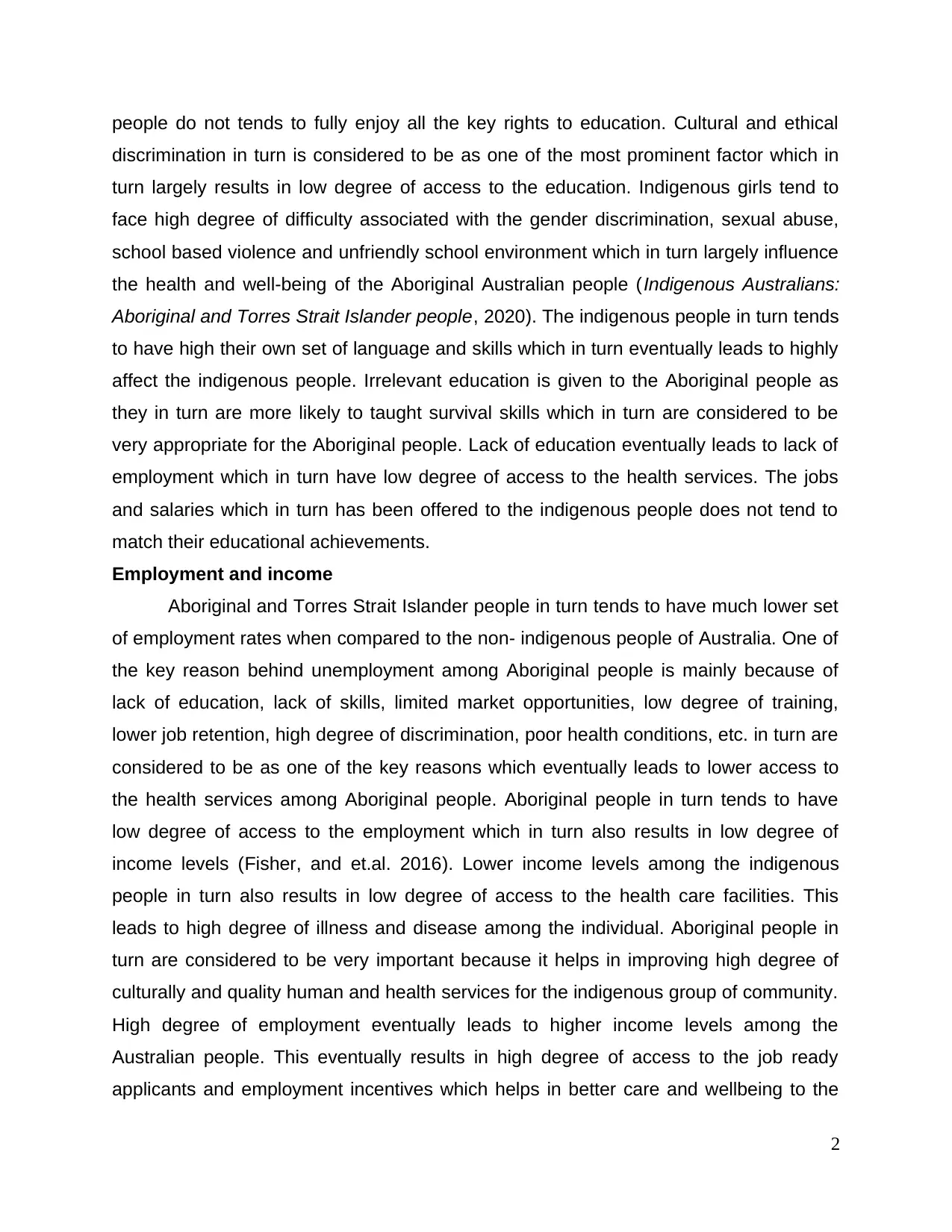
people do not tends to fully enjoy all the key rights to education. Cultural and ethical
discrimination in turn is considered to be as one of the most prominent factor which in
turn largely results in low degree of access to the education. Indigenous girls tend to
face high degree of difficulty associated with the gender discrimination, sexual abuse,
school based violence and unfriendly school environment which in turn largely influence
the health and well-being of the Aboriginal Australian people (Indigenous Australians:
Aboriginal and Torres Strait Islander people, 2020). The indigenous people in turn tends
to have high their own set of language and skills which in turn eventually leads to highly
affect the indigenous people. Irrelevant education is given to the Aboriginal people as
they in turn are more likely to taught survival skills which in turn are considered to be
very appropriate for the Aboriginal people. Lack of education eventually leads to lack of
employment which in turn have low degree of access to the health services. The jobs
and salaries which in turn has been offered to the indigenous people does not tend to
match their educational achievements.
Employment and income
Aboriginal and Torres Strait Islander people in turn tends to have much lower set
of employment rates when compared to the non- indigenous people of Australia. One of
the key reason behind unemployment among Aboriginal people is mainly because of
lack of education, lack of skills, limited market opportunities, low degree of training,
lower job retention, high degree of discrimination, poor health conditions, etc. in turn are
considered to be as one of the key reasons which eventually leads to lower access to
the health services among Aboriginal people. Aboriginal people in turn tends to have
low degree of access to the employment which in turn also results in low degree of
income levels (Fisher, and et.al. 2016). Lower income levels among the indigenous
people in turn also results in low degree of access to the health care facilities. This
leads to high degree of illness and disease among the individual. Aboriginal people in
turn are considered to be very important because it helps in improving high degree of
culturally and quality human and health services for the indigenous group of community.
High degree of employment eventually leads to higher income levels among the
Australian people. This eventually results in high degree of access to the job ready
applicants and employment incentives which helps in better care and wellbeing to the
2
discrimination in turn is considered to be as one of the most prominent factor which in
turn largely results in low degree of access to the education. Indigenous girls tend to
face high degree of difficulty associated with the gender discrimination, sexual abuse,
school based violence and unfriendly school environment which in turn largely influence
the health and well-being of the Aboriginal Australian people (Indigenous Australians:
Aboriginal and Torres Strait Islander people, 2020). The indigenous people in turn tends
to have high their own set of language and skills which in turn eventually leads to highly
affect the indigenous people. Irrelevant education is given to the Aboriginal people as
they in turn are more likely to taught survival skills which in turn are considered to be
very appropriate for the Aboriginal people. Lack of education eventually leads to lack of
employment which in turn have low degree of access to the health services. The jobs
and salaries which in turn has been offered to the indigenous people does not tend to
match their educational achievements.
Employment and income
Aboriginal and Torres Strait Islander people in turn tends to have much lower set
of employment rates when compared to the non- indigenous people of Australia. One of
the key reason behind unemployment among Aboriginal people is mainly because of
lack of education, lack of skills, limited market opportunities, low degree of training,
lower job retention, high degree of discrimination, poor health conditions, etc. in turn are
considered to be as one of the key reasons which eventually leads to lower access to
the health services among Aboriginal people. Aboriginal people in turn tends to have
low degree of access to the employment which in turn also results in low degree of
income levels (Fisher, and et.al. 2016). Lower income levels among the indigenous
people in turn also results in low degree of access to the health care facilities. This
leads to high degree of illness and disease among the individual. Aboriginal people in
turn are considered to be very important because it helps in improving high degree of
culturally and quality human and health services for the indigenous group of community.
High degree of employment eventually leads to higher income levels among the
Australian people. This eventually results in high degree of access to the job ready
applicants and employment incentives which helps in better care and wellbeing to the
2
⊘ This is a preview!⊘
Do you want full access?
Subscribe today to unlock all pages.

Trusted by 1+ million students worldwide
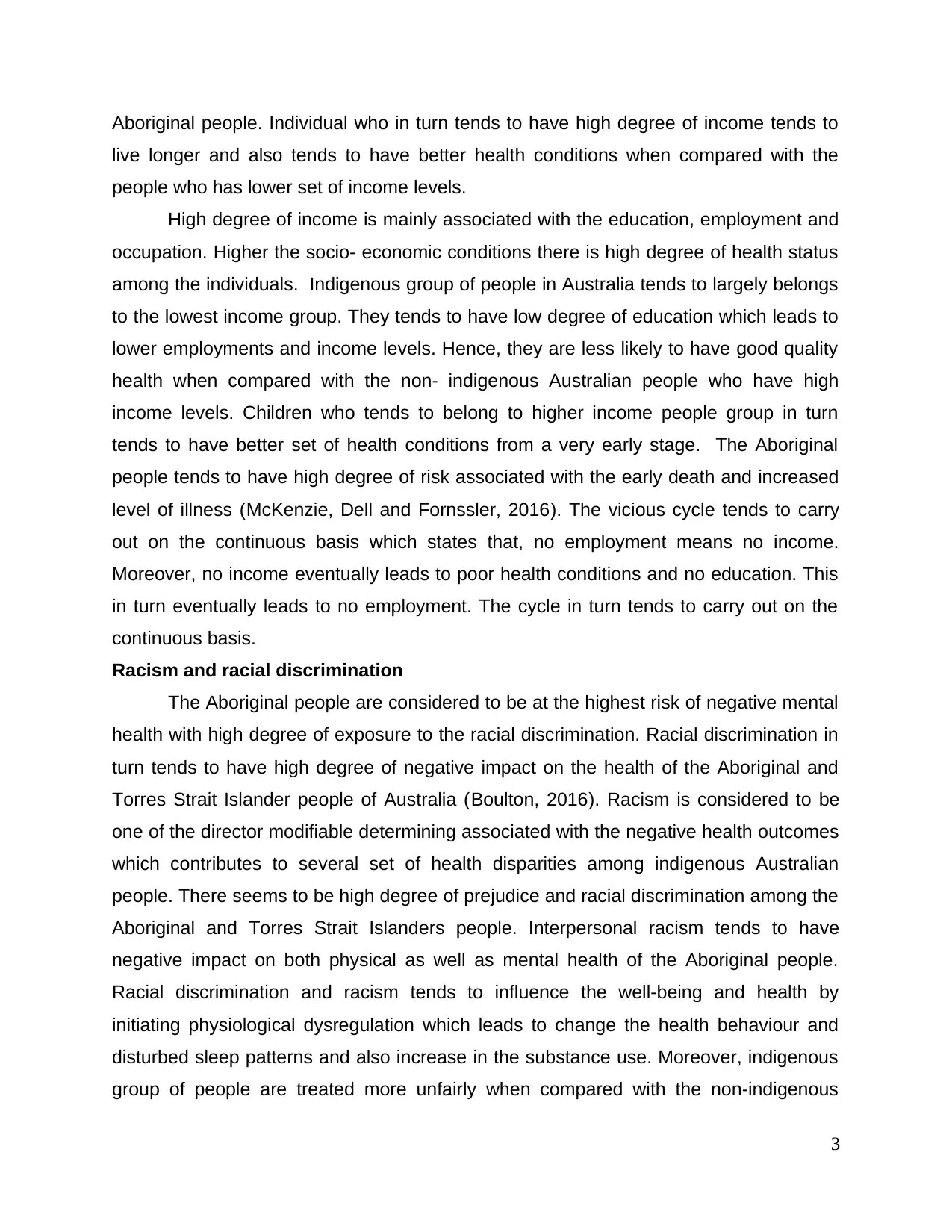
Aboriginal people. Individual who in turn tends to have high degree of income tends to
live longer and also tends to have better health conditions when compared with the
people who has lower set of income levels.
High degree of income is mainly associated with the education, employment and
occupation. Higher the socio- economic conditions there is high degree of health status
among the individuals. Indigenous group of people in Australia tends to largely belongs
to the lowest income group. They tends to have low degree of education which leads to
lower employments and income levels. Hence, they are less likely to have good quality
health when compared with the non- indigenous Australian people who have high
income levels. Children who tends to belong to higher income people group in turn
tends to have better set of health conditions from a very early stage. The Aboriginal
people tends to have high degree of risk associated with the early death and increased
level of illness (McKenzie, Dell and Fornssler, 2016). The vicious cycle tends to carry
out on the continuous basis which states that, no employment means no income.
Moreover, no income eventually leads to poor health conditions and no education. This
in turn eventually leads to no employment. The cycle in turn tends to carry out on the
continuous basis.
Racism and racial discrimination
The Aboriginal people are considered to be at the highest risk of negative mental
health with high degree of exposure to the racial discrimination. Racial discrimination in
turn tends to have high degree of negative impact on the health of the Aboriginal and
Torres Strait Islander people of Australia (Boulton, 2016). Racism is considered to be
one of the director modifiable determining associated with the negative health outcomes
which contributes to several set of health disparities among indigenous Australian
people. There seems to be high degree of prejudice and racial discrimination among the
Aboriginal and Torres Strait Islanders people. Interpersonal racism tends to have
negative impact on both physical as well as mental health of the Aboriginal people.
Racial discrimination and racism tends to influence the well-being and health by
initiating physiological dysregulation which leads to change the health behaviour and
disturbed sleep patterns and also increase in the substance use. Moreover, indigenous
group of people are treated more unfairly when compared with the non-indigenous
3
live longer and also tends to have better health conditions when compared with the
people who has lower set of income levels.
High degree of income is mainly associated with the education, employment and
occupation. Higher the socio- economic conditions there is high degree of health status
among the individuals. Indigenous group of people in Australia tends to largely belongs
to the lowest income group. They tends to have low degree of education which leads to
lower employments and income levels. Hence, they are less likely to have good quality
health when compared with the non- indigenous Australian people who have high
income levels. Children who tends to belong to higher income people group in turn
tends to have better set of health conditions from a very early stage. The Aboriginal
people tends to have high degree of risk associated with the early death and increased
level of illness (McKenzie, Dell and Fornssler, 2016). The vicious cycle tends to carry
out on the continuous basis which states that, no employment means no income.
Moreover, no income eventually leads to poor health conditions and no education. This
in turn eventually leads to no employment. The cycle in turn tends to carry out on the
continuous basis.
Racism and racial discrimination
The Aboriginal people are considered to be at the highest risk of negative mental
health with high degree of exposure to the racial discrimination. Racial discrimination in
turn tends to have high degree of negative impact on the health of the Aboriginal and
Torres Strait Islander people of Australia (Boulton, 2016). Racism is considered to be
one of the director modifiable determining associated with the negative health outcomes
which contributes to several set of health disparities among indigenous Australian
people. There seems to be high degree of prejudice and racial discrimination among the
Aboriginal and Torres Strait Islanders people. Interpersonal racism tends to have
negative impact on both physical as well as mental health of the Aboriginal people.
Racial discrimination and racism tends to influence the well-being and health by
initiating physiological dysregulation which leads to change the health behaviour and
disturbed sleep patterns and also increase in the substance use. Moreover, indigenous
group of people are treated more unfairly when compared with the non-indigenous
3
Paraphrase This Document
Need a fresh take? Get an instant paraphrase of this document with our AI Paraphraser
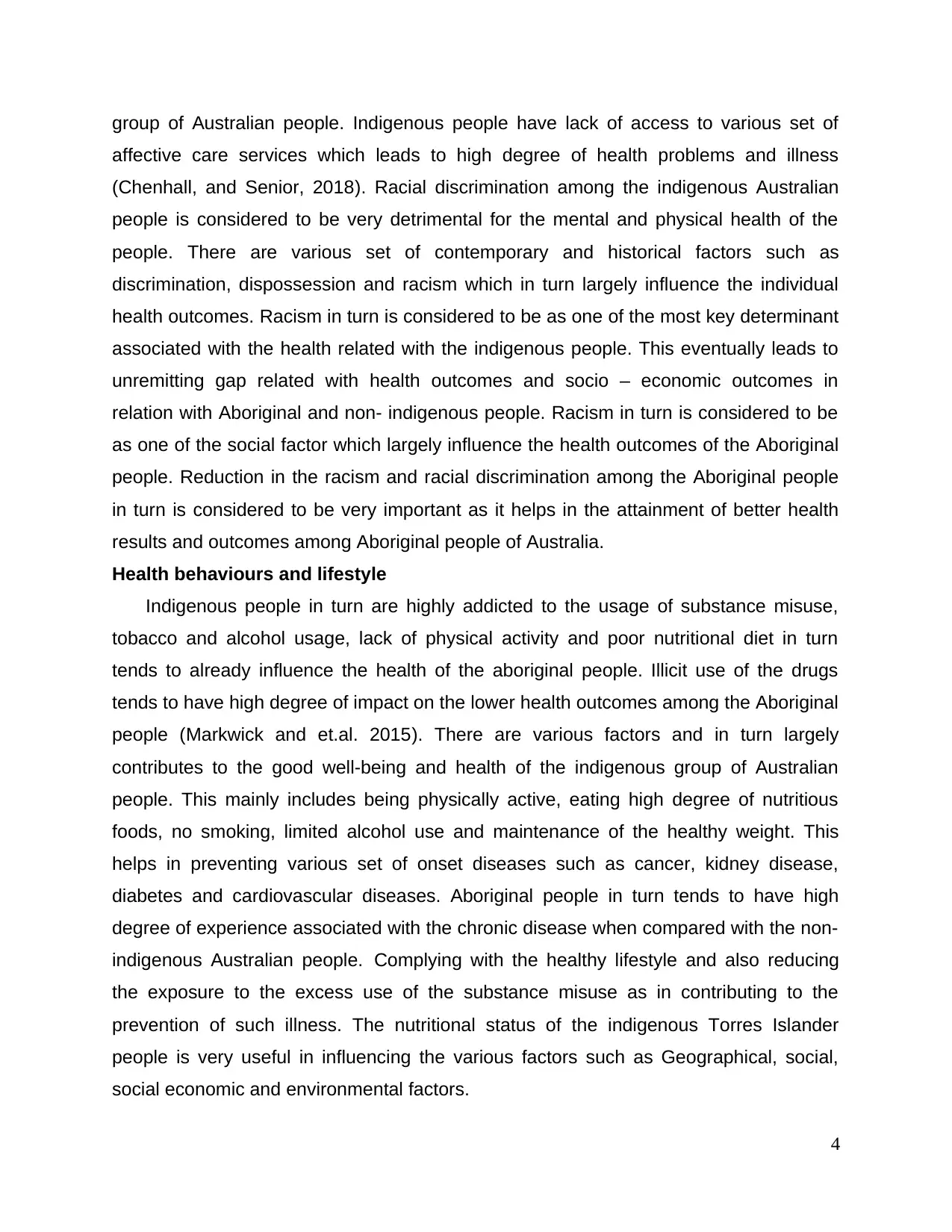
group of Australian people. Indigenous people have lack of access to various set of
affective care services which leads to high degree of health problems and illness
(Chenhall, and Senior, 2018). Racial discrimination among the indigenous Australian
people is considered to be very detrimental for the mental and physical health of the
people. There are various set of contemporary and historical factors such as
discrimination, dispossession and racism which in turn largely influence the individual
health outcomes. Racism in turn is considered to be as one of the most key determinant
associated with the health related with the indigenous people. This eventually leads to
unremitting gap related with health outcomes and socio – economic outcomes in
relation with Aboriginal and non- indigenous people. Racism in turn is considered to be
as one of the social factor which largely influence the health outcomes of the Aboriginal
people. Reduction in the racism and racial discrimination among the Aboriginal people
in turn is considered to be very important as it helps in the attainment of better health
results and outcomes among Aboriginal people of Australia.
Health behaviours and lifestyle
Indigenous people in turn are highly addicted to the usage of substance misuse,
tobacco and alcohol usage, lack of physical activity and poor nutritional diet in turn
tends to already influence the health of the aboriginal people. Illicit use of the drugs
tends to have high degree of impact on the lower health outcomes among the Aboriginal
people (Markwick and et.al. 2015). There are various factors and in turn largely
contributes to the good well-being and health of the indigenous group of Australian
people. This mainly includes being physically active, eating high degree of nutritious
foods, no smoking, limited alcohol use and maintenance of the healthy weight. This
helps in preventing various set of onset diseases such as cancer, kidney disease,
diabetes and cardiovascular diseases. Aboriginal people in turn tends to have high
degree of experience associated with the chronic disease when compared with the non-
indigenous Australian people. Complying with the healthy lifestyle and also reducing
the exposure to the excess use of the substance misuse as in contributing to the
prevention of such illness. The nutritional status of the indigenous Torres Islander
people is very useful in influencing the various factors such as Geographical, social,
social economic and environmental factors.
4
affective care services which leads to high degree of health problems and illness
(Chenhall, and Senior, 2018). Racial discrimination among the indigenous Australian
people is considered to be very detrimental for the mental and physical health of the
people. There are various set of contemporary and historical factors such as
discrimination, dispossession and racism which in turn largely influence the individual
health outcomes. Racism in turn is considered to be as one of the most key determinant
associated with the health related with the indigenous people. This eventually leads to
unremitting gap related with health outcomes and socio – economic outcomes in
relation with Aboriginal and non- indigenous people. Racism in turn is considered to be
as one of the social factor which largely influence the health outcomes of the Aboriginal
people. Reduction in the racism and racial discrimination among the Aboriginal people
in turn is considered to be very important as it helps in the attainment of better health
results and outcomes among Aboriginal people of Australia.
Health behaviours and lifestyle
Indigenous people in turn are highly addicted to the usage of substance misuse,
tobacco and alcohol usage, lack of physical activity and poor nutritional diet in turn
tends to already influence the health of the aboriginal people. Illicit use of the drugs
tends to have high degree of impact on the lower health outcomes among the Aboriginal
people (Markwick and et.al. 2015). There are various factors and in turn largely
contributes to the good well-being and health of the indigenous group of Australian
people. This mainly includes being physically active, eating high degree of nutritious
foods, no smoking, limited alcohol use and maintenance of the healthy weight. This
helps in preventing various set of onset diseases such as cancer, kidney disease,
diabetes and cardiovascular diseases. Aboriginal people in turn tends to have high
degree of experience associated with the chronic disease when compared with the non-
indigenous Australian people. Complying with the healthy lifestyle and also reducing
the exposure to the excess use of the substance misuse as in contributing to the
prevention of such illness. The nutritional status of the indigenous Torres Islander
people is very useful in influencing the various factors such as Geographical, social,
social economic and environmental factors.
4
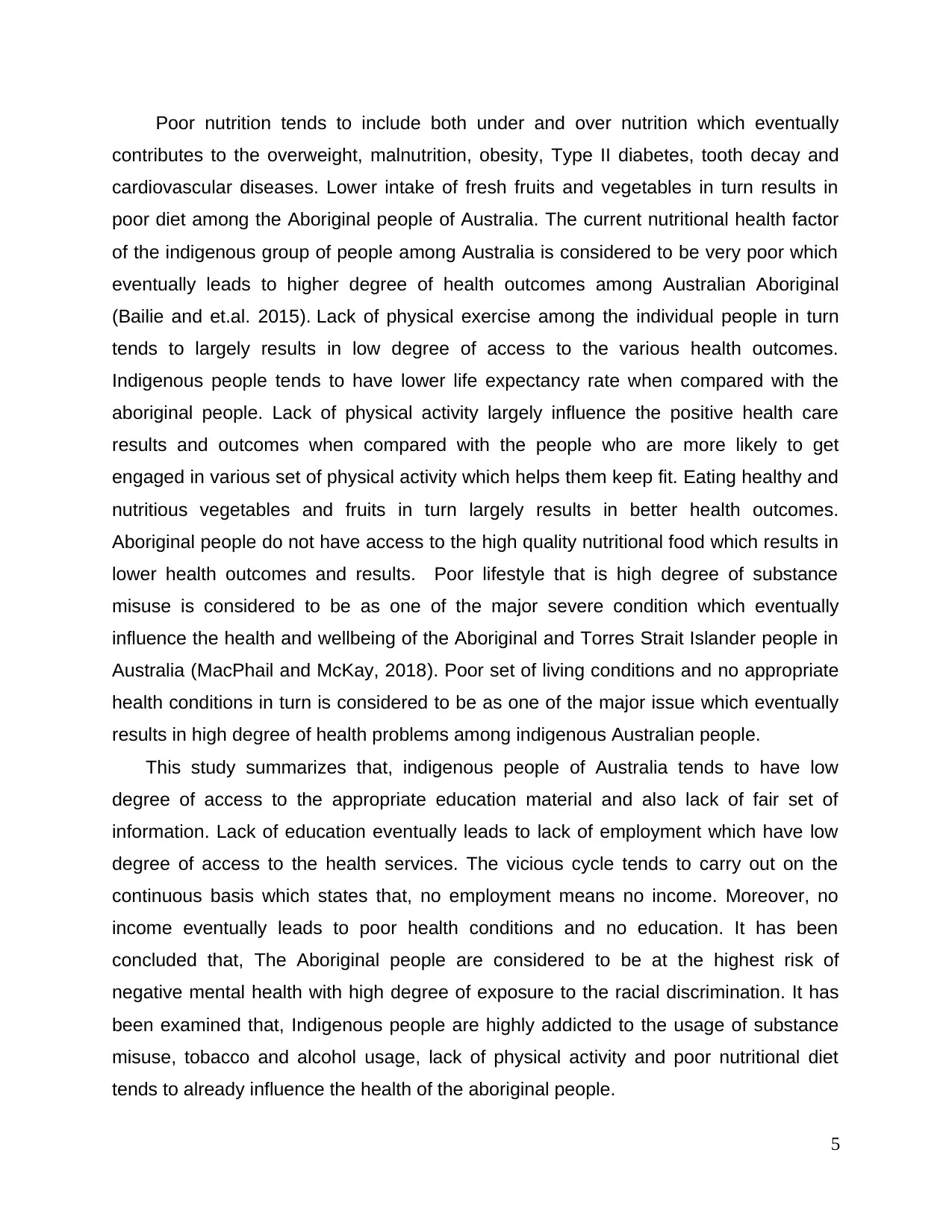
Poor nutrition tends to include both under and over nutrition which eventually
contributes to the overweight, malnutrition, obesity, Type II diabetes, tooth decay and
cardiovascular diseases. Lower intake of fresh fruits and vegetables in turn results in
poor diet among the Aboriginal people of Australia. The current nutritional health factor
of the indigenous group of people among Australia is considered to be very poor which
eventually leads to higher degree of health outcomes among Australian Aboriginal
(Bailie and et.al. 2015). Lack of physical exercise among the individual people in turn
tends to largely results in low degree of access to the various health outcomes.
Indigenous people tends to have lower life expectancy rate when compared with the
aboriginal people. Lack of physical activity largely influence the positive health care
results and outcomes when compared with the people who are more likely to get
engaged in various set of physical activity which helps them keep fit. Eating healthy and
nutritious vegetables and fruits in turn largely results in better health outcomes.
Aboriginal people do not have access to the high quality nutritional food which results in
lower health outcomes and results. Poor lifestyle that is high degree of substance
misuse is considered to be as one of the major severe condition which eventually
influence the health and wellbeing of the Aboriginal and Torres Strait Islander people in
Australia (MacPhail and McKay, 2018). Poor set of living conditions and no appropriate
health conditions in turn is considered to be as one of the major issue which eventually
results in high degree of health problems among indigenous Australian people.
This study summarizes that, indigenous people of Australia tends to have low
degree of access to the appropriate education material and also lack of fair set of
information. Lack of education eventually leads to lack of employment which have low
degree of access to the health services. The vicious cycle tends to carry out on the
continuous basis which states that, no employment means no income. Moreover, no
income eventually leads to poor health conditions and no education. It has been
concluded that, The Aboriginal people are considered to be at the highest risk of
negative mental health with high degree of exposure to the racial discrimination. It has
been examined that, Indigenous people are highly addicted to the usage of substance
misuse, tobacco and alcohol usage, lack of physical activity and poor nutritional diet
tends to already influence the health of the aboriginal people.
5
contributes to the overweight, malnutrition, obesity, Type II diabetes, tooth decay and
cardiovascular diseases. Lower intake of fresh fruits and vegetables in turn results in
poor diet among the Aboriginal people of Australia. The current nutritional health factor
of the indigenous group of people among Australia is considered to be very poor which
eventually leads to higher degree of health outcomes among Australian Aboriginal
(Bailie and et.al. 2015). Lack of physical exercise among the individual people in turn
tends to largely results in low degree of access to the various health outcomes.
Indigenous people tends to have lower life expectancy rate when compared with the
aboriginal people. Lack of physical activity largely influence the positive health care
results and outcomes when compared with the people who are more likely to get
engaged in various set of physical activity which helps them keep fit. Eating healthy and
nutritious vegetables and fruits in turn largely results in better health outcomes.
Aboriginal people do not have access to the high quality nutritional food which results in
lower health outcomes and results. Poor lifestyle that is high degree of substance
misuse is considered to be as one of the major severe condition which eventually
influence the health and wellbeing of the Aboriginal and Torres Strait Islander people in
Australia (MacPhail and McKay, 2018). Poor set of living conditions and no appropriate
health conditions in turn is considered to be as one of the major issue which eventually
results in high degree of health problems among indigenous Australian people.
This study summarizes that, indigenous people of Australia tends to have low
degree of access to the appropriate education material and also lack of fair set of
information. Lack of education eventually leads to lack of employment which have low
degree of access to the health services. The vicious cycle tends to carry out on the
continuous basis which states that, no employment means no income. Moreover, no
income eventually leads to poor health conditions and no education. It has been
concluded that, The Aboriginal people are considered to be at the highest risk of
negative mental health with high degree of exposure to the racial discrimination. It has
been examined that, Indigenous people are highly addicted to the usage of substance
misuse, tobacco and alcohol usage, lack of physical activity and poor nutritional diet
tends to already influence the health of the aboriginal people.
5
⊘ This is a preview!⊘
Do you want full access?
Subscribe today to unlock all pages.

Trusted by 1+ million students worldwide
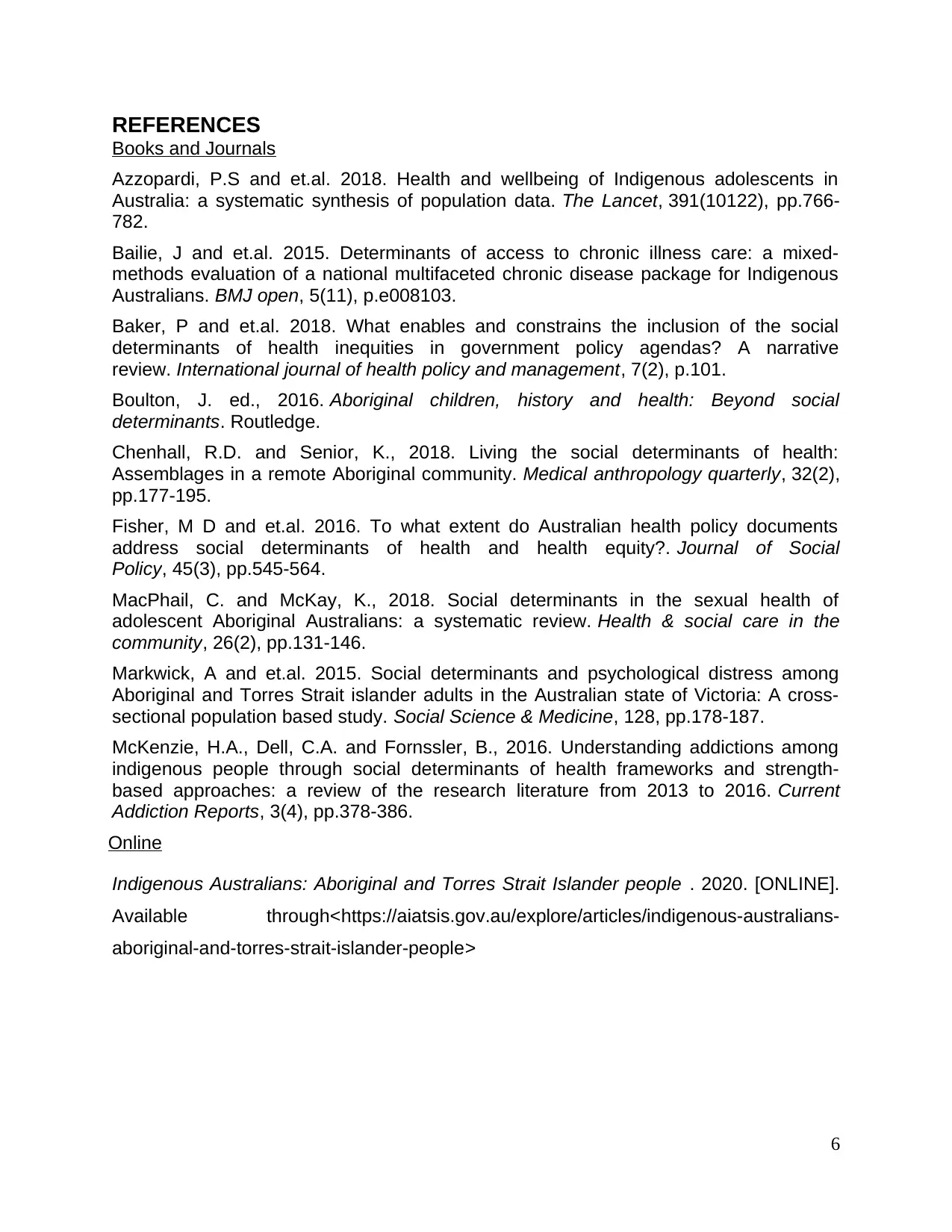
REFERENCES
Books and Journals
Azzopardi, P.S and et.al. 2018. Health and wellbeing of Indigenous adolescents in
Australia: a systematic synthesis of population data. The Lancet, 391(10122), pp.766-
782.
Bailie, J and et.al. 2015. Determinants of access to chronic illness care: a mixed-
methods evaluation of a national multifaceted chronic disease package for Indigenous
Australians. BMJ open, 5(11), p.e008103.
Baker, P and et.al. 2018. What enables and constrains the inclusion of the social
determinants of health inequities in government policy agendas? A narrative
review. International journal of health policy and management, 7(2), p.101.
Boulton, J. ed., 2016. Aboriginal children, history and health: Beyond social
determinants. Routledge.
Chenhall, R.D. and Senior, K., 2018. Living the social determinants of health:
Assemblages in a remote Aboriginal community. Medical anthropology quarterly, 32(2),
pp.177-195.
Fisher, M D and et.al. 2016. To what extent do Australian health policy documents
address social determinants of health and health equity?. Journal of Social
Policy, 45(3), pp.545-564.
MacPhail, C. and McKay, K., 2018. Social determinants in the sexual health of
adolescent Aboriginal Australians: a systematic review. Health & social care in the
community, 26(2), pp.131-146.
Markwick, A and et.al. 2015. Social determinants and psychological distress among
Aboriginal and Torres Strait islander adults in the Australian state of Victoria: A cross-
sectional population based study. Social Science & Medicine, 128, pp.178-187.
McKenzie, H.A., Dell, C.A. and Fornssler, B., 2016. Understanding addictions among
indigenous people through social determinants of health frameworks and strength-
based approaches: a review of the research literature from 2013 to 2016. Current
Addiction Reports, 3(4), pp.378-386.
Online
Indigenous Australians: Aboriginal and Torres Strait Islander people . 2020. [ONLINE].
Available through<https://aiatsis.gov.au/explore/articles/indigenous-australians-
aboriginal-and-torres-strait-islander-people>
6
Books and Journals
Azzopardi, P.S and et.al. 2018. Health and wellbeing of Indigenous adolescents in
Australia: a systematic synthesis of population data. The Lancet, 391(10122), pp.766-
782.
Bailie, J and et.al. 2015. Determinants of access to chronic illness care: a mixed-
methods evaluation of a national multifaceted chronic disease package for Indigenous
Australians. BMJ open, 5(11), p.e008103.
Baker, P and et.al. 2018. What enables and constrains the inclusion of the social
determinants of health inequities in government policy agendas? A narrative
review. International journal of health policy and management, 7(2), p.101.
Boulton, J. ed., 2016. Aboriginal children, history and health: Beyond social
determinants. Routledge.
Chenhall, R.D. and Senior, K., 2018. Living the social determinants of health:
Assemblages in a remote Aboriginal community. Medical anthropology quarterly, 32(2),
pp.177-195.
Fisher, M D and et.al. 2016. To what extent do Australian health policy documents
address social determinants of health and health equity?. Journal of Social
Policy, 45(3), pp.545-564.
MacPhail, C. and McKay, K., 2018. Social determinants in the sexual health of
adolescent Aboriginal Australians: a systematic review. Health & social care in the
community, 26(2), pp.131-146.
Markwick, A and et.al. 2015. Social determinants and psychological distress among
Aboriginal and Torres Strait islander adults in the Australian state of Victoria: A cross-
sectional population based study. Social Science & Medicine, 128, pp.178-187.
McKenzie, H.A., Dell, C.A. and Fornssler, B., 2016. Understanding addictions among
indigenous people through social determinants of health frameworks and strength-
based approaches: a review of the research literature from 2013 to 2016. Current
Addiction Reports, 3(4), pp.378-386.
Online
Indigenous Australians: Aboriginal and Torres Strait Islander people . 2020. [ONLINE].
Available through<https://aiatsis.gov.au/explore/articles/indigenous-australians-
aboriginal-and-torres-strait-islander-people>
6
1 out of 7
Related Documents
Your All-in-One AI-Powered Toolkit for Academic Success.
+13062052269
info@desklib.com
Available 24*7 on WhatsApp / Email
![[object Object]](/_next/static/media/star-bottom.7253800d.svg)
Unlock your academic potential
Copyright © 2020–2026 A2Z Services. All Rights Reserved. Developed and managed by ZUCOL.





